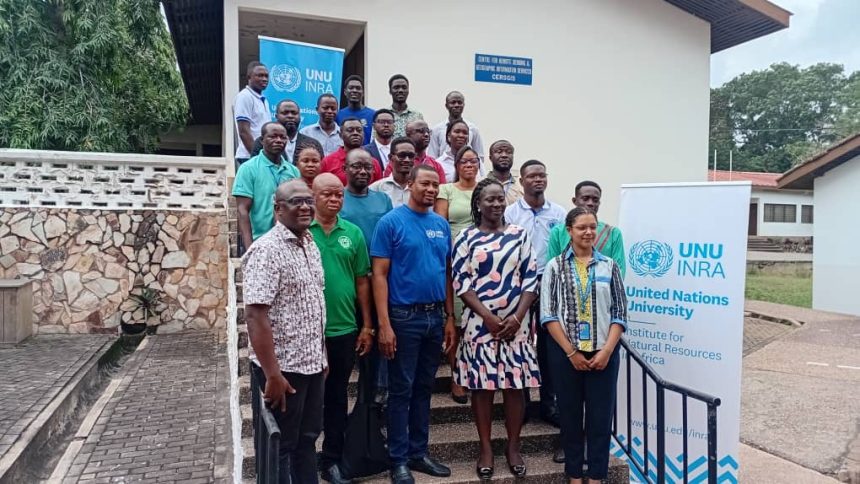The United Nations University Institute for Natural Resources in Africa (UNU-INRA), in collaboration with the Department of Geography and Resource Development at the University of Ghana, has organized a special session at the Ghana Geographers Association Conference under the theme “Greenhouse Gas Emissions and Mitigation Options under Climate and Land Use Change in West Africa: A Concerted Regional Modelling and Observation Assessment.”
The session highlighted key findings from the CONCERT Project—an acronym derived from the session’s theme—which is a four-year multidisciplinary research initiative investigating the causes of climate change, its impact on soil health, and sustainable land-use strategies to mitigate these challenges.
UNU-INRA’s research, fully funded by the German Federal Ministry of Education and Research (BMBF) through the West African Science Service Centre on Climate Change and Adapted Land Use (WASCAL), focused on land use and land cover changes (LULCC) in northern Ghana.
The findings were presented at a seminar held on September 25, 2025, at the University of Ghana’s Department of Geography and Resource Development.
Speaking at the event, Mr. Kenneth Aidoo, Research Fellow at UNU-INRA and lead researcher on the project, highlighted the current state of savanna land use and land cover (LULC) in northern Ghana.
He emphasized that the project focused on harmonizing previous LULC maps to generate a standardized map for the study year, enabling better comparability across temporal scales.
“Many previous studies in northern Ghana have used inconsistent thematic land cover classes, making it difficult to compare land use trends over time. Our approach harmonizes these datasets to ensure consistency and enhance decision-making,” Aidoo explained.
Mr. Aidoo further noted that the team projected future land cover scenarios based on past and current LULC maps, revealing potential outcomes if present trends continue unchecked. He called on the government and development agencies to intensify afforestation and land restoration efforts to safeguard vegetation cover and ecological stability.
Also presenting at the session was Mr. Samuel Guug of the Kwame Nkrumah University of Science and Technology (KNUST), a partner institution on the CONCERT Project. His presentation underscored the significant contribution of rice farming to methane emissions in Ghana.
“Flooded rice fields are a major source of methane—a gas 84 times more potent than carbon dioxide in warming the planet,” Mr. Guug stated.
“Stagnant water in rice farms creates anaerobic conditions that trigger methane production. To mitigate this, the government must invest in proper drainage systems to prevent prolonged flooding,” he added.
He emphasized that while smallholder farmers are unable to afford such infrastructure, government support—particularly through the Ministry of Food and Agriculture—could play a crucial role in reducing agricultural greenhouse gas emissions.
From the University of Augsburg, Dr. Souleymane Sy, the CONCERT Project Coordinator, highlighted the central role of vegetation in maintaining soil integrity and combating climate change.
“When soils are left bare, nutrients are lost, and their capacity to store carbon diminishes. Planting grasses and shrubs restores soil health and helps offset human-induced degradation,” Dr. Sy noted.
He urged the government to make reforestation and land restoration a national priority within Ghana’s climate adaptation strategy.
“We have developed a habit of cutting down trees without replanting them. It is time for the government to reinvest part of the revenue from the timber industry into reforestation. This is essential if we want to slow down global warming,” he emphasized.
The session concluded with a collective call from researchers and policymakers for stronger collaboration in implementing sustainable land management and climate mitigation measures across northern Ghana.
—
Story by Xavier Mensah | univers.ug.edu.gh
Edited by Gabriel Tecco Mensah

